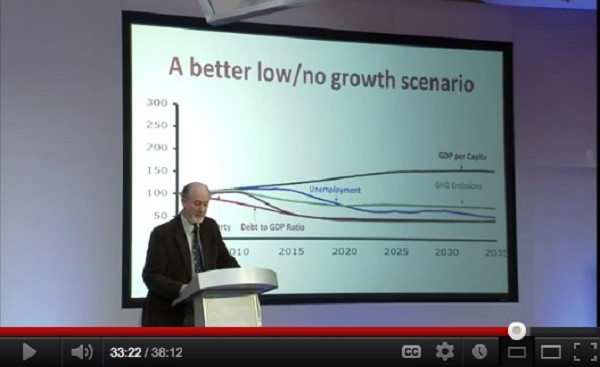 Peter Victor of the Capital Institute argues that research findings suggest a steady-state economy may be preferable to economic growth.
Peter Victor of the Capital Institute argues that research findings suggest a steady-state economy may be preferable to economic growth.
A NEW ECONOMY: HOW? MSU Seminar Mar. 26 to "Re-imagine" the Future
March 22, 2013
By: Dave Rogers
A seminar entitled "Re-Imagining our Economic System: A Balanced and Sustainable Economy" is scheduled March 26 at the MSU Union in East Lansing.
"Participants at the Institute will have the opportunity to learn from and discuss with innovative thinkers and doers from across the state and nation on how we might re-imagine our economic paradigm and examine strategies that may help us achieve a fundamental transformation to a more balanced and sustainable economy," said Rex LaMore, of the sponsoring Center for Economic Development.
During the event participants will discuss:
- What are the basic assumptions of our current economic system?
- How has the current economic system succeeded and in what ways has it failed us?
- What Could a New Economy Look Like?
- Where do we go from here to achieve greater balance between our
economic, social, and environmental systems?
Michigan, as a result of its unique Great Lakes heritage and
historically strong manufacturing economy could lead the nation in
framing a new social and economic paradigm, said Mr. LaMore.
He envisions and economy that is environmentally sustainable in scale, socially just and efficient in its use and distribution of resources, values a high quality of life and reaffirms our commitment to a democratic society. "Such a paradigm shift must be led by an informed public that has a vision of the character and scope of a re-imagined economy." he said.
As interested partners and leaders in community and economic development balancing environmental, social and economic interest is a critical element of our success.
The schedule:
9:00-9:15 a.m. Welcome
9:15-10:30 a.m. Panel 1: What Is the Current Economy For?
Basic principles, assumptions and characteristics of the current economy.
Social, political and environmental consequences of the current economic model.
Sustainability of the current economic paradigm.
Moderator- Rex LaMore, Director of MSU Center for Community and Economic Development
Panelists: Charlie Ballard, MSU Department of Economics; Jim MacInnes, President/Co-owner Crystal
Mountain Resort
10:45-noon Panel 2: How has the current economic system succeeded and in what ways has it failed us?
Gains realized from our current system, such as better technologies, status of global wealth and standards of living.
Negative consequences of the consumer economy, such as income inequality, consumption trends and environmental
degradation.
The general dominance of one economic system over other models and the environmental, the social and political consequences of the dominant system.
Lessons learned and strategies for action toward change.
Moderator- Richard Norton, University of Michigan Urban and Regional Planning
Panelists: Kurt Cobb, Post-Carbon Institute; Lana Pollack, International Joint Commission; Juliet Schor, Boston
College Department of Sociology
LUNCH: "On your own" with colleagues from the event. A number of local restaurants are directly north of the MSU Union on Grand River Ave. in E. Lansing.
1:30-2:45 Panel 3: What Could a New Economy Look Like?
Potential strengths and weakness of the new paradigm.
Aspects of the new economy, cultural considerations, scalability, social justice and equality.
Impacts on livelihood, businesses, the environment.
Moderator-Louise Jezierski, MSU James Madison College
Panelists: Ted Howard, Executive Director of The Democracy Collaborative at University of Maryland; Joshua Farley, University of Vermont Community Development & Applied Economics and Public Administration; Tom Princen, U of M School of Natural Resources and Environment
3:00-4:15 Panel 4: Where do we go from here to achieve greater balance between our economic, social, and environmental systems?
Emerging and promising local and global models.
Responsibility of wealthy nations to lead a transformation.
Organizations and individuals who are, or can assist with a transformation toward the new economic model.
Short and long terms strategies and measures to indicate progress.
Moderator - Robert Richardson, MSU Department of Community, Agriculture, Recreation and Resource Studies
Panelists: Christina Keller, Cascade Engineering; Wynne Wright, MSU Department of Community, Agriculture, Recreation, and Resource Studies; Ray DeYoung, U of M School of Natural Resources and Environment
No pre-registration is required, however space is limited.
Contact: http://ced.msu.edu/upload/institute/MSU%20CCED%20Institute
###
